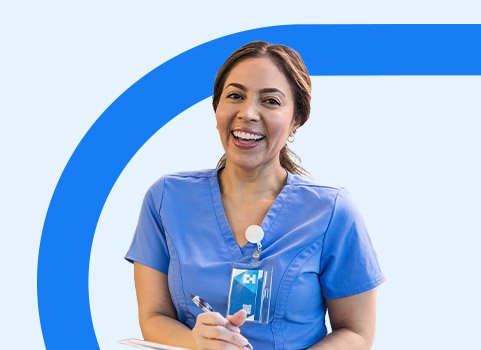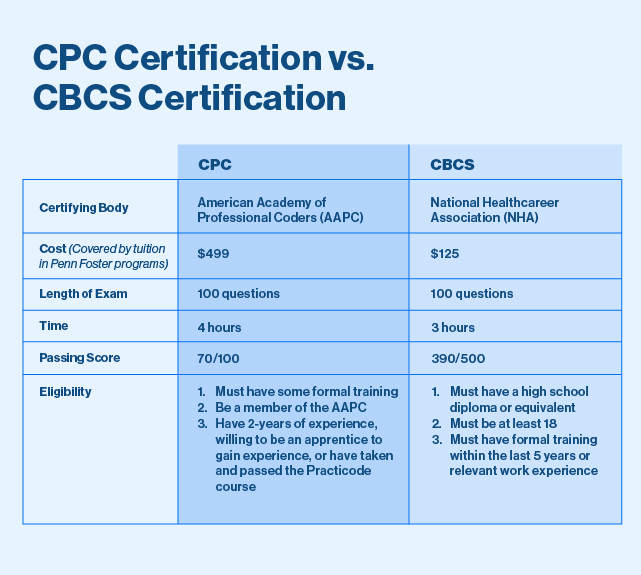
Medical Coding Professional vs. Medical Billing and Coding: What’s the Difference?
Apr 17, 2024
6 min read
Penn Foster offers multiple paths to prepare you for a career in medical coding or billing. Here are the differences between each program to help you decide which is best for you.
What is the Medical Coding Professional Training Program?
Penn Foster’s online Medical Coding Professional Training Program is designed to help you prepare to accelerate your medical coding career. While the program does cover the essential healthcare knowledge needed to work in healthcare – from medical terminology to an understanding of HIPAA – it especially focuses on coding. Through this program, you’ll learn how to understand and use various common coding systems, including CPT, ICD, and HCPCS. You’ll also cover using ICD-10 codes for outpatient diagnostics.
The curriculum of this program is aligned to the Certified Professional Coder (CPC) exam offered by the American Academy for Professional Coders (AAPC). That means that, upon completing your studies, you’ll be able to confidently sit for the certification exam.
Read more: Must Have Medical Billing and Coding Skills
What does the online Medical Coding Training Program prepare you for?
The Medical Coding Professional Training Program can help prepare learners for a new career as a Certified Professional Coder, Certified Medical Coder, or Medical Coding and Billing Specialist. It also helps you prepare to sit for the CPC exam. It measures your practical coding knowledge and earning the CPC credential can help your resume stand out when you’re applying for jobs!
However, in most cases, when you sit for and pass the CPC exam, you’re only considered an apprentice – a CPC-A – until you’ve also completed 2 years of documented, relevant work experience. But, through our online Medical Coding Training, you can speed that timeline up! Our program includes the AAPC Practicode course and the additional coding practicums which together meet the AAPC (2-years) work experience requirements. This means that when you complete your program with Penn Foster, complete the Practicode course, and pass the CPC exam, you’re a fully credentialed Certified Professional Coder – no work requirement needed!
What is the CPC exam?
The CPC, or Certified Professional Coder, exam is the gold-standard medical coding certification test offered by the American Academy of Professional Coders (AAPC). It measures your skills in understanding and applying standard codes for different medical services and diagnostics.
The test itself is made up of 100 multiple-choice questions and it is timed, so you have 4 hours to complete the exam. To pass it, you must get at least 70% of the questions right. The cost of 2 exam attempts is covered by your Medical Coding Professional Training tuition, so if you don’t pass the first time, you don’t have to stress about paying for a second attempt.
What is Penn Foster’s Medical Billing and Coding Program?
Penn Foster’s Medical Billing and Coding Career Diploma is designed to help prepare learners who are new to the field for jobs in medical coding and medical billing. This program focuses on a broad range of healthcare knowledge and covers both coding and billing processes. Your classes can help you prepare to sit for the Certified Billing & Coding Specialist (CBCS) exam offered by the National Healthcareer Association (NHA) and the cost of the exam is covered by your program tuition!
Read more: Your Medical Billing & Coding Salary Guide
What does Penn Foster’s Medical Billing and Coding Program prepare you for?
What is the CBCS exam?
CPC certification vs. CBCS certification
So, which medical coding and billing certification is right for you? It really depends on what kind of career you’re looking for.
If you’re someone who wants to focus more on the coding side, gaining CPC certification can be the most helpful, allowing you to stand out to employers and showing that you have the documented skills to get the job done.
If you’re someone who is more interested in billing or reimbursement processes, then the CBCS could be a better fit.
Either way, each credential can strengthen your resume. While some medical billing and coding jobs don’t necessarily require you to be certified to qualify for the role, having certification that clearly demonstrates your skills can be beneficial. It can also potentially help you earn more money! On average, certified medical billing and coding professionals can earn up to 17.7% more** than those who aren’t certified. Generally, the highest paid medical coders hold one or more of the following certifications: CDEO, CPC, or COC.*

Penn Foster Program Comparison
Medical Coding and Billing Program Comparison
| Medical Coding Professional | Medical Billing & Coding Career Diploma | |
|---|---|---|
| About the Program | Focused more on outpatient coding than billing, this program is aligned to the CPC exam. Throughout your courses, you’ll cover foundational healthcare knowledge, from anatomy and physiology to HIPAA, as well as learn in-depth coding skills in your Outpatient Coding class. Once you’ve completed your courses online, you can prepare to sit for the CPC exam to become a certified medical coder! | This program is designed to help prepare learners who are new to the field for jobs in medical coding and medical billing. This program focuses on a broad range of healthcare knowledge and covers both coding and billing processes. Once you’ve completed your courses, you can prepare to sit for the CBCS exam to become certified! |
| Certification | Certified Professional Coder (CPC) exam offered by the American Academy of Professional Coders (AAPC) | Certified Billing & Coding Specialist (CBCS) exam offered by the National Healthcareer Association (NHA) |
| Career Outcome | Helps you prepare for a career as a certified professional coder, certified medical coder, or a medical coding and billing specialist.
Average Salary: $58,895* |
Helps you prepare for a career as medical billing and coding specialist, medical records specialist, or a medical billing specialist.
Average Salary: $47,180** |
| Estimated Completion Time | Up to 18 months, though it can be completed much sooner depending on how much time you have to dedicate to your studies | Fast track = 11 months Average time = 15 months*** |
| Tuition | Pay In Full: $2,199 Monthly Auto Payments: $2,599 |
Pay In Full: $999 Monthly Auto Payments: $1399 |
| Program Type | Career Diploma | Career Diploma |
| What's Included |
|
|
Read more: What Healthcare Career is Right for You?
Take the next steps toward an in-demand career today!
Both the Medical Coding Professional Training Program and the Medical Billing and Coding Career Diploma can be a steppingstone to an in-demand healthcare career. If you’re still not sure which program is right for you, learn more about them by checking out our full program comparison page!
Disclaimers:
* American Academy of Professional Coders. “2023 Medical Coding and Billing Salary Report.” AAPC.com. Accessed February 27, 2024.
**Bureau of Labor Statistics, U.S. Department of Labor. "Medical Records and Health Information Technicians." Occupational Outlook Handbook. Accessed October 2, 2023.
Statements found in the United States Department of Labor Occupational Outlook Handbook are not a guarantee of any post-graduation salary, in part because the data used to create the Occupational Outlook Handbook includes workers from differing educational backgrounds, levels of experience, and geographic areas of the country.
*** The estimated completion time for this program is based on completion times for learners enrolled in this program from 5/2021 - 4/2022, excluding withdrawals.




